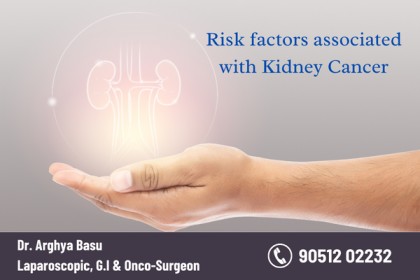best cancer specialist for kidney cancer treatment

Risk factors associated with Kidney Cancer
Risk factors are likely triggers that can increase your chances of getting a disease like cancer. Every variant of cancer has different risk factors. Some factors, such as smoking and drinking, can be controlled, but factors such as age, gender, and environmental factors cannot be controlled. The best cancer specialist in Kolkata is available for proper treatment.
What is kidney cancer?
Kidney cancer accounts for approximately 3% of all cancers reported in India. It usually occurs after age 50, and the male-to-female ratio is 3:1.
Kidney cancer rates are gradually increasing due to changes in urban living and eating habits. Medical oncologists or chemotherapy doctors treat cancer with drugs, including chemotherapy, immunotherapy, and targeted therapies.
Kidney cancer occurs when healthy cells in one or both kidneys proliferate to form a bump-like tumor. Another common type of cancer in women is breast cancer, which an abreast surgeon must treat.
Renal cell carcinoma, or RCC, is the most common type of kidney cancer and occurs in the renal tubules, the small tubes in the kidneys that clean blood and make urine. There are many types of RCC, such as clear cell, chromophore, and papillary renal cell carcinoma.
Kidney cancer can be treated in several ways depending on the type, size, and stage. A few popular treatments are:
A surgery called a nephrectomy. The main goal is to get rid of the tumor and surrounding tissue.
Some minor kidney abnormalities are monitored in the CT scan to see if they change. This is usually done for small incisions and should be avoided if you have other medical conditions.
Thermal ablation destroys cancer cells and is usually used for small tumors.
Embolization is done to stop bleeding in the kidney and is a rare treat.
Biologically targeted therapy is a drug that prevents the formation of new blood vessels.
What are the risk factors for kidney cancer?
Medical experts have discovered several factors that can increase your chances of kidney cancer. The best way to prevent the development of this disease is to be aware of and control our impact on it.
Kidney cancer risk factors are general, genetic, and lifestyle.
General
Age: Kidney cancer is common in people over 50, with an average age of diagnosis of 60 years. The older you get, the higher your risk of getting kidney cancer.
Gender: Kidney cancer is more familiar in men than women, with a ratio of 3.5:1.
Hypertension: People with uncontrolled high blood pressure are prone to kidney cancer.
Dialysis: People on long-term dialysis for kidney disease are more likely to develop kidney cancer.
Genetics
Kidney cancer is associated with certain genetic conditions and a family history of kidney cancer. Genetic disorders such as:
1. Von Hippel-Lindau disease, which causes tumors in the kidneys due to a genetic mutation
2. Hereditary papillary renal cell carcinoma affecting both kidneys
3. Bert-Hogg-Dubé syndrome is a skin disease that affects our hair follicles and can lead to gas bubbles in the lungs and tumors in the kidneys
4. Hereditary renal carcinoma, low grade
5. Hereditary leiomyoma-renal cell carcinoma, a rare genetic mutation characterized by cutaneous elevations or large uterine fibroids (in women)
6. Sclerosis tuberous complex (TSC) is a genetic mutation in the skin that can affect changes in the brain, kidneys, and heart and increase the chance of developing kidney cancer.
How can kidney cancer be prevented?
There is no proven way to prevent kidney cancer, but a simple lifestyle and eating habits can help immensely. Here’s the result to the body when an individual quits smoking.
Blood pressure decreases because uncontrolled high blood pressure can damage, narrow, weaken, or harden the arteries around the kidneys, leading to kidney cancer.
Eat fresh vegetables and fruits and drink plenty of water to maintain a healthy weight.
Keep your body in good shape by reducing fat intake and exercising regularly.
Conclusion –
An individual suffering from chronic kidney disease or cancer often requires a kidney transplant. According to statistics, more than 1 50 000 patients are waiting for a kidney transplant in India. However, only 1 in 30 patients become kidney donors.
FAQ –
1. What is the most potent risk factor for renal cell cancer?
Current data suggest that smoking, obesity, and arterial hypertension are the best-known risk factors for sporadic RCC worldwide. Acquired cystic kidney disease is a significant risk factor for dialysis patients.
1. Is kidney cancer a genetic risk?
In most cases, kidney cancer is not passed from parents to children. Kidney cancer that affects several generations of a family is called hereditary kidney cancer. Hereditary kidney cancer is rare and accounts for 5% to 8% of all kidney cancers. It is usually associated with hereditary syndrome.